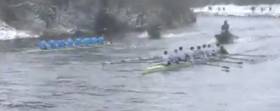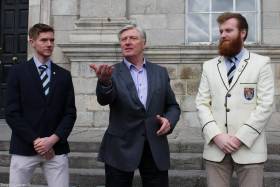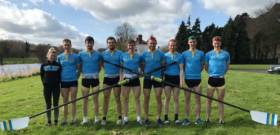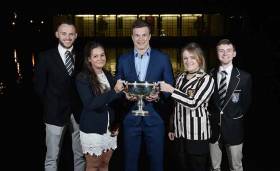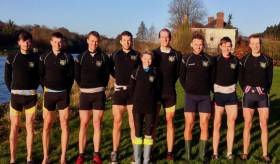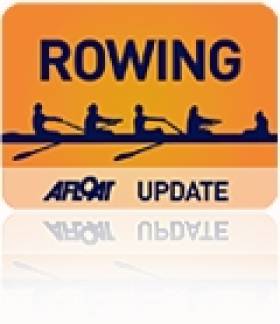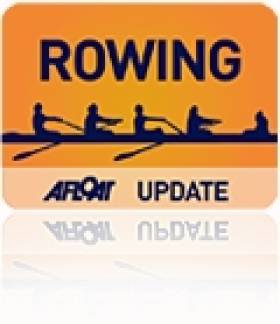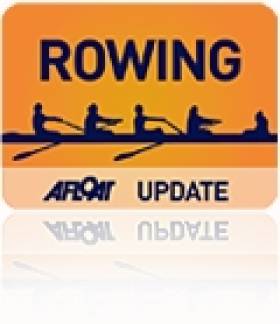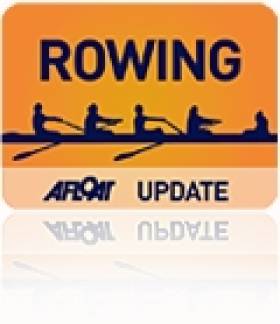Displaying items by tag: Gannon Cup
UCD take Gannon Cup after Tough Battle
#Rowing: UCD won the Gannon Cup for senior men and Trinity the Corcoran Cup for senior women at the Colours Races in Dublin today.
Trinity lead early in the Gannon, but once the crews came through Grattan Bridge, UCD pushed into the lead. The lead stood at one length through the next four bridges, but Trinity whittled it to two-thirds from there, making for a good finish. UCD held on to win.
Trinity were outstanding winners of the Corcoran Cup. They carved out a big lead early on and went on to win easily.
UCD’s novice women also built on a good start to win the Sally Moorhead trophy, while Trinity won the men’s novice race and took the Dan Quinn Shield.
Colours Races 2019, Dublin
Gannon Cup (Senior Men): UCD (Rob Brown, Jack Stacey, Andrew Goff, Shane O’Connell, Thomas Earley, Andrew Kelly, Cameron Murphy, David O’Malley; cox: Orlagh Reid) bt Trinity 2/3 l
Corcoran Cup (Senior Women): Trinity (Anna Mangan, Ellen Clohessy, Ruthie McHugh, Jane Hogg, Aoife Corcoran, Erika Deasy, Miriam Kelly, Aoife McGranaghan; cox: Clare White) bt UCD easily
Dan Quinn Shield (Novice Men): Trinity bt UCD 3l
Sally Moorhead Trophy (Novice Women): UCD bt Trinity 3l.
Trinity Draw on Fitness to win Gannon Cup
#Rowing; Trinity won the Gannon Cup with a fine performance today. The Colours races were run on a reverse of the Trinity Regatta course above the weir for safety reasons. There was a strong east wind and a powerful flow.
UCD took a one-length lead in the Gannon Cup at the first bend, but Trinity came back to lead and held on. Trinity’s senior women won the Corcoran Cup with a commading performance.
The novice women’s title (the Sally Moorhead Trophy) was won easily by UCD. The closest race of the day was the novice men’s race, which was a thrilling contest. Trinity led past the boat clubs, but UCD overtook them and led by a length. Trinity came back to retake the lead … only for UCD to overhaul them right at the finish line.
Colours Races 2018, Islandbridge (raced above the weir because of bad weather)
Senior Men (Gannon Cup): Trinity (B Cronin, D Butler, W Doyle, G Moore, A Liadov, D Pierse, T Hughes, M Quigley; cox: R Hamilton) bt UCD, ¾ l.
Novice Men (Dan Quinn Shield): UCD bt Trinity 2ft.
Senior Women (Corcoran Cup): Trinity (D Maguire, S Kelly, A Byrne, J Hogg, A Corcoran, C Dempsey, L McHugh, S Higgins; cox: M Jungmann) bt UCD easily.
Novice Women (Sally Moorhead Cup): UCD bt Trinity easily
UCD Rowers Win the Spin In First Colours Battle
#Rowing: UCD won both coin tosses and will row from the North Station in all four Colours races on the Liffey on March 18th. Pat Kenny performed the coin toss at Trinity College, assisted by the four captains: Emma Thornton (UCD Ladies Boat Club); Laura Walsh (Dublin University Boat Club), Shane Mulvaney (UCD Boat Club) and Conor Ryan (Dublin University Boat Club).
The toss was set for early in the week but was delayed until Thursday.
The schedule set for Sunday, March 18th, is:
10:30 Sally Moorhead Trophy (novice women)
11:00 Dan Quinn Shield (novice men)
11:30 Corcoran Cup (senior women)
12:00 Gannon Cup (senior men)
UCD in Command in Gannon Cup
#Rowing: UCD came out on top in the Gannon Cup for senior men and the Corcoran Cup for senior women on the Liffey today – but in very different races.
Trinity led for most of the Corcoran Cup race, holding off strong UCD pushes. It looked set up for an excellent finish – but then Trinity’s rudder fell off. They had terrible steering difficulties, and UCD powered through to win well.
UCD’s senior men were in command from early on. They made light of their weight disadvantage into the strong, gusting, wind to build a good lead, despite rowing on the South Station, which is less favoured in the early stages.
Trinity won the novice men’s race and UCD the novice women’s.
Colours Races 2017
Men, Senior (Gannon Cup):
UCD (S Bolger, S O’Connell, T Doherty, M Murphy, S Mulvaney, A Griffin, E Gleeson, D O’Malley; cox: O Reid) bt Trinity 3l.
Novice (Dan Quinn Shield): Trinity bt UCD 2l
Women, Senior (Corcoran Cup)
UCD (S Matthews, V Connolly, R Ryan, G Youl, D Callanan, J Coleman, R Gilligan, E Lambe; cox: S Ní Fhinn) bt Trinity easily.
Novice (Sally Moorhead Trophy); UCD bt Trinity easily.
UCD Start on South Station For Gannon Cup Showdown
#Rowing: Trinity won the toss for both the Corcoran Cup women’s race and Gannon Cup men’s contest at the Colours Races this weekend on the Liffey. Trinity opted to take the North Station in both cases. The toss was performed by Josh Van Der Flier, the international rugby player. The races are set for Saturday, March 18th, on the Liffey from O’Connell Bridge to St James’s Gate.
Novice women (Sally Moorhead Trophy) 1.30pm
Novice men (Dan Quinn Shield) - 2pm
Senior women (Corcoran Cup) - 2.30pm
Senior men (Gannon Cup) - 3pm
UCD Senior Women's Crew:
Cox - Síne Ní Fhinn
Stroke Eimear Lambe
7 Ruth Gilligan
6 Jane Coleman
5 Daisy Callanan
4 Gersende Youl
3 Rachel Ryan
2 Vanessa Connolly
Bow Sarah Matthews
UCD Senior Men's Crew:
Cox - Orlagh Reid
8 David O'Malley
7 Eoin Gleeson
6 Andrew Griffin
5 Shane Mulvaney
4 Max Murphy
3 Tiarnan Doherty
2 Shane O'Connell
1 Sam Bolger
DULBC
Sally Moorhead (novices)
1. Bow: Kathryn Yeow
2. Ellen Murphy
3. Molly Brennan
4. Pheobe Warren
5. Aideen Fay
6. Gabrielle Giuscitte
7. Anna Mangan
Stroke: Jane Hogg
Corcoran Cup (seniors)
1. Bow: Susie O‘Neill
2. Nora Fisher
3. Gemma Foley
4. Aoife Corcoran
5. Caoimhe Dempsey
6. Hannah McCarthy
7. Sarah Higgins
8. Laura Walsh
DUBC
Gannon Cup (Senior)
Cox Conor Keogh
Stroke Mark Quigley
7 Adam Browne
6 Patrick Moreau
5 Liam Hawkes
4 Matthew Mitchell
3 Josh Norton
2 Andrej Liadov
Bow William Doyle
Dan Quinn (Novice/Junior)
Cox Hannah Colgan
Stroke Ross Layden
7 Andrew Burgess
6 Paul Peters
5 Constantine Knauer
4 Brian Egan
3 John Taaffe
2 Gavin Moore
Bow Paulus Heemskerk
UCD Take Gannon and Corcoran Cups
#Rowing: UCD carried off the Gannon and Corcoran Cups for senior men and women in the Colours races on the Liffey today. In both races, strong starts in the difficult conditions were the key. In the Corcoran Cup, the bigger and more powerful UCD women’s crew had one quarter length by the Ha’penny Bridge, and coming through Capel Street Bridge they extended it to over a length. They went on to win comfortably. The UCD men’s crew also got off the start much more smoothly than Trinity. Trinity mounted a number of attacks down the course, but UCD held them off and won by over a length.
The novice men’s race for the Dan Quinn Shield provided Trinity with a chance to impress, with the crew in white taking command early and having the race won by the Four Courts. The novice women’s race was similarly one-sided, with UCD having only to paddle home after Trinity’s stroke woman caught a crab after only a few seconds of the race.
Colours Races 2016, O’Connell Bridge to St James’s Gate, Saturday:
Men – Senior (Gannon Cup): UCD (E Gleeson, D Somers, T Hughes, A Griffin, E O’Connor, M Murphy, S Mulvaney, D O’Malley; cox: O Reid) bt Trinity 1 1/3 l . Novice (Dan Quinn Shield): Trinity bt UCD, easily.
Women – Senior (Corcoran Cup): UCD (D Callanan, J Coleman, A O’Riordan, E Lambe, O Finnegan, R Gilligan, S Bennett, K O’Connor; cox: J Gilligan) bt Trinity a distance. Novice (Sally Moorhead Trophy): UCD bt Trinity easily.
Clean Sweep for Trinity over UCD on Liffey
#ROWING: Trinity won all four Colours races on the Liffey today. In the Gannon Cup for senior men, the men in black and white hoops took a small early advantage, stretched it to three-quarters of a length by Capel Street Bridge and won by one-and-a-half lengths. The two novice races were surprisingly one-sided for the Dublin University crews. The best race of the day was the women’s senior contest, for the Corcoran Cup. UCD took an early advantage and led for most of the race. But Trinity were impressively controlled in their rowing and took the lead through the last two bridges. They stretched their advantage to half a length at the finish.
Colours Races 2015, Liffey, Dublin, Saturday, March 14th.
Senior Men (Gannon Cup): Trinity (A Browne, W Doyle, J Magan, M Corcoran, P Moreau, M Kelly, L Hawkes, D Butler; cox: C Flynn) bt UCD 1½ l
Novice (Dan Quinn Shield): Trinity bt UCD, easily
Senior Women (Corcoran Cup): Trinity (G Crowe, H O’Neill, H McCarthy, S Healy, S O’Brien, A Leahy, L McHugh, R Morris; cox: N Williams) bt UCD ½ l
Novice (Sally Moorhead trophy): Trinity bt UCD easily
UCD Rowers Win Terrific Gannon Cup Race
#ROWING: UCD won the Gannon Cup for senior men after a terrific struggle, while Trinity senior women took the Corcoran Cup in facile fashion at the Colours Rowing Races on the Liffey today.
Trinity’s crew led the Gannon Cup race from just after the start, but could not gain a clearwater lead. UCD’s pushes were relentless, and though they were still behind coming through the final bridge, Watling Street, they then powered through and had command of the race when Trinity’s number four man and captain, Luke Acheson, collapsed. The race was not rowed out. It took a long time – too long - to get Acheson into an ambulance, as he had to be brought up the river all the way to City Quay before being lifted up the steps. He was being treated in St James’s Hospital this afternoon.
Trinity’s Corcoran Cup crew demonstrated that size is not everything in rowing. They were outsiders, but simply rowed better than UCD. They eked out an early lead and built it steadily into an unassailable margin by the end.
UCD’s annexation of the Sally Moorhead Trophy for novice women was also one-sided, but Trinity took the novice men’s title after UCD suffered a boat-stopping crab right in front of the Four Courts. UCD came back to lead briefly, but Trinity took control again before the finish.
Colours Rowing Races, O’Connell Bridge to St James’s Gate
Men – Senior (Gannon Cup): UCD (M Bailey, W Yeomans, C O’Riada, B Crosse, D O’Neill, A Griffin, P Moore, N Kenny (stroke); cox: L Mulvihill) bt Trinity not rowed out. Novice (Dan Quinn Shield): Trinity bt UCD 1 ½ l.
Women – Senior (Corcoran Cup): Trinity (G Crowe, H O’Neill, H McCarthy, R Deasy, S O’Brien, A Leahy, S Cass, R Morris (stroke); cox: N Williams) bt UCD easily.
Novice (Sally Moorhead Trophy): UCD bt Trinity easily.
UCD Rowers Target Seventh Consecutive Gannon Cup
The Gannon Cup Committee have announced the arrangements for the 2014 Dublin University Boat Races between Trinity College Dublin and University College Dublin. The Colours rowing races will this year take place on Sunday, March 16th, in association with the official St Patrick’s Festival. The races will be contested on the River Liffey from O’Connell Bridge to St James’ Gate Brewery. The senior men's race (The Gannon Cup) is set for 11 o'clock and the senior women's race (Corcoran Cup) 10.30. The programme will commence at 9:30am with the novice women racing for the Sally Moorhead Trophy, followed by the novice men’s race for the Dan Quinn Shield at 10am.
A winter of extreme weather conditions has led to the cancellation of the majority of Rowing Ireland events, making it hard to predict the outcome of what promises to be a very exciting series of races.
For Susannah Cass, who will row in the seven seat of Trinity's Corcoran Cup crew, this is just the first test in a summer of rowing adventures. Susannah will be racing across the Irish Sea in the Celtic Challenge race in May, before competing in the world’s first Pacific Ocean rowing race – a 2,400 mile challenge from California to Hawaii. Meanwhile, in the UCD crew, the Gilligan sisters will be hoping to keep the Corcoran Cup in the family, as Aoife enlists her sister Ruth’s help in defending the title.
The senior men's race will have its 66th staging on Sunday. The Gannon Cup was founded in 1947 in memory of former UCD captain Ciarán Gannon, who lost his life serving in the Royal Army Medical Corps in Burma in 1944. There were no races in 1957 and 1958. UCD have dominated the event in recent years and will be hoping to make this their 7th consecutive win with the help of a strong crew of promising young athletes including World Under-23 silver medallist Niall Kenny. Trinity hope the return of coach Nick Dunlop, whose record includes a number of convincing Gannon Cup wins, turns the UCD tide.
Trinity won the coin toss hosted at Leinster House by Taoiseach Enda Kenny. They chose to race on the north station in both the men’s and women’s races.
The university boat races are an annual event on the River Liffey echoing the world famous Oxford/Cambridge University Boat Race in London. In 1980 Trinity were presented with the Corcoran Cup as winners of the inaugural women’s boat race; however, UCD responded strongly to this initial defeat and currently lead the series by 21 wins to Trinity’s 13. Races for novice men and women were introduced in 2004 and 2005 respectively.
Spectator buses will follow the races and depart from the O’Connell Bridge.
Program of events:
9:30am The Moorhead Trophy – Novice Women (holder Trinity)
10:00am The Dan Quinn Perpetual Shield – Novice Men (holder UCD)
10:30am The Corcoran Cup – Senior Women (holder UCD)
11:00am The Gannon Cup – Senior Men (holder UCD)
UCD Rowers Take Gannon and Corcoran Cups Again
# ROWING: UCD produced an exact repeat of last year in the Colours Races on the Liffey today by winning the senior men’s and women’s events and also taking the novice men’s race. Trinity again won the women’s novice eights race with a dominant performance.
The senior men’s race was won in the first 20 metres: UCD’s big crew gained a crucial advantage and exploited it so competently that they had the race in the bag by the Four Courts. The win gave Dave Neale a record sixth Gannon Cup crown.
The UCD senior women also started well and established a good lead, but Trinity nipped away at them down the course and lost by only a half length.
The men’s novice eight race ended before the line, as Trinity crashed into the wall after Watling Street Bridge due to a snapped steering line. UCD had taken the furthest south arch in Winetavern Street bridge, prompting a Trinity objection, but the race umpire said that he had told the crew to avoid the marked centre lane due to a possible hindrance there.
Colours Races 2013
Men – Eight, Senior (Gannon Cup): UCD (L McCarthy, M Bailey, P Moore, A Sheehan, D Neale, J Nihotte, G Duane, P Grogan; cox: K Joyce) bt Trinity 4l
Eight, Novice (Dan Quinn Shield): UCD bt Trinity not rowed out
Women – Eight, Senior (Corcoran Cup) UCD (A O’Riordan, K Joy, O Finnegan, S Bennett, C Ni Reachtagain, G Collins, A Gilligan, B Lait; cox C McGowan) bt Trinity ½ l
Eight, Novice (Sally Moorhead Trophy): Trinity bt UCD easily.


























